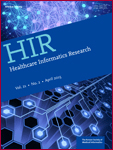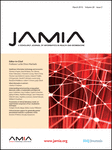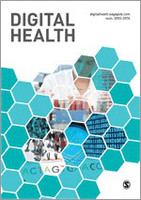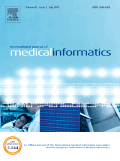
Healthcare Informatics Research
Scope & Guideline
Advancing healthcare through innovative informatics solutions.
Introduction
Aims and Scopes
- Digital Health Technologies:
Research on mobile applications, telemedicine, and digital platforms that enhance healthcare delivery and patient engagement. - Artificial Intelligence in Healthcare:
Studies exploring the integration of AI and machine learning in diagnostics, predictive analytics, and decision support systems. - Data Management and Interoperability:
Investigations into standards, frameworks, and practices that ensure effective data sharing and interoperability in health information systems. - Patient-Centered Care and Self-Management:
Research focused on technologies and methodologies that empower patients in managing their health and improving outcomes. - Ethical and Social Implications:
Examination of ethical considerations, public attitudes, and policy implications surrounding the use of health informatics and technologies. - Education and Competency Development:
Studies assessing the informatics competencies required for healthcare professionals and the effectiveness of educational programs.
Trending and Emerging
- Integration of Artificial Intelligence:
There is a notable increase in studies focusing on AI applications in healthcare, particularly in predictive analytics, diagnostics, and personalized treatment planning. - Mobile Health and Telemedicine:
Research on mobile health applications and telemedicine continues to grow, emphasizing their role in patient management and healthcare access, particularly post-COVID-19. - Data Analytics and Big Data:
Emerging themes around big data analytics in healthcare for improving decision-making, operational efficiency, and patient outcomes are gaining prominence. - Ethical AI and Technology Use:
Increasing attention is being paid to the ethical implications of AI and technology in healthcare, including fairness, transparency, and accountability. - Interoperability Standards and Frameworks:
Research focused on developing and implementing interoperability standards is on the rise, reflecting the need for seamless data exchange across healthcare systems. - Patient Engagement and Self-Management Tools:
There is a growing focus on tools and technologies that empower patients to take an active role in their healthcare, enhancing self-management and adherence to treatment.
Declining or Waning
- Traditional Medical Informatics Approaches:
Research that primarily focuses on older methodologies without integrating newer technologies or paradigms has seen a decrease, as the field moves towards more innovative and technology-driven solutions. - Generalized Data Privacy Concerns:
While data privacy remains important, specific studies focused on general privacy issues without a technological or contextual framework are less frequently published, as the discourse becomes more nuanced. - Basic Telehealth Studies:
Earlier investigations into telehealth have shifted towards more complex analyses involving AI and integrated systems, leading to fewer basic descriptive studies. - Single-Country Case Studies:
Research that only examines healthcare informatics within a single country has diminished, as there is a growing emphasis on comparative studies and global perspectives. - Focus on Non-Digital Health Interventions:
Research centered on non-digital or traditional healthcare practices is declining, with a stronger emphasis on digital health innovations.
Similar Journals

Journal of Information and Communication Technology-Malaysia
Enhancing Accessibility to Pioneering ResearchJournal of Information and Communication Technology-Malaysia is a respected open-access journal published by UNIV UTARA MALAYSIA PRESS, dedicated to advancing knowledge in the fields of Information Technology, Computer Science, and Mathematics. With an ISSN of 1675-414X and an E-ISSN of 2180-3862, this journal has been providing a platform for innovative research since its establishment in 2009. The journal is indexed in Scopus with commendable rankings in Mathematics and Computer Science categories, highlighting its contribution to the academic community, particularly with its Q3 quartile status in both fields as of 2023. As it converges research from 2011 to 2024, the journal invites submissions that explore contemporary challenges and technological advancements, catering to a global audience of researchers, professionals, and students interested in the rapidly evolving domains of ICT. By ensuring open access to its articles, the journal promotes widespread dissemination and accessibility of cutting-edge research, thereby supporting the collaborative development of ideas and solutions in these critical areas.

JOURNAL OF THE AMERICAN MEDICAL INFORMATICS ASSOCIATION
Empowering Healthcare Professionals with Pioneering ResearchThe Journal of the American Medical Informatics Association, published by Oxford University Press, stands as a premier publication within the field of Health Informatics, showcasing cutting-edge research and innovative practices. With an impressive Q1 category ranking in 2023 and a remarkable Scopus rank of #6 out of 138, this journal consistently contributes to the advancement of knowledge and application in medical informatics, making it a vital resource for researchers, healthcare professionals, and students alike. Since its inception in 1994, the journal has fostered interdisciplinary collaboration and provides a platform for high-quality research that drives improvements in healthcare practices and technology. Although it operates on a subscription model, the journal's impactful findings and comprehensive analyses are essential for those looking to stay at the forefront of health informatics innovations.

Digital Health
Connecting Research and Practice in the Digital Health Sphere.Digital Health is a pioneering open-access journal published by SAGE Publications Ltd, dedicated to advancing the field of health technology and its intersection with health policy, informatics, and the broader medical landscape. Since its inception in 2015, the journal has rapidly established itself as an essential resource for researchers, professionals, and students, serving as a platform for innovative research that leverages digital tools to improve health outcomes. Currently ranked in the Q2 category across four relevant domains, including Computer Science Applications and Health Informatics, it commands respect within the academic community. With its accessible framework, Digital Health facilitates the dissemination of critical findings and new methodologies that inform policy and practice. The journal’s commitment to open access promotes worldwide access and cooperation, making significant contributions to the evolving landscape of digital health.

Romanian Journal of Information Technology and Automatic Control-Revista Romana de Informatica si Automatica
Connecting Minds in the World of Automation and ITThe Romanian Journal of Information Technology and Automatic Control (Revista Romana de Informatica si Automatica), published by the National Institute for Research and Development in Informatics (ICI), serves as a vital platform for the dissemination of research and developments in the fields of information technology and automation. With its Open Access policy since 2011, this journal ensures that innovative research is readily available to the global academic community, promoting knowledge sharing and collaboration. Based in Bucharest, Romania, the journal is well-positioned to contribute to both local and international discussions surrounding technological advancements, fostering a rich exchange of ideas among researchers, professionals, and students. The journal features original research articles, review papers, and case studies catering to both theoretical and practical aspects of the discipline, thus reinforcing its commitment to addressing contemporary challenges in information technology and automation.

INTERNATIONAL JOURNAL OF MEDICAL INFORMATICS
Exploring the Future of Health Information SystemsInternational Journal of Medical Informatics, published by Elsevier Ireland Ltd, is a premier peer-reviewed journal dedicated to advancing the field of health informatics. Established in 1997, this journal has consistently strived to disseminate high-quality research and innovative practices, now recognized in the Q1 quartile of health informatics for 2023, ranking impressively at #24 out of 138 in Scopus. The journal's focus encompasses the integration of computer science and information technology in healthcare, fostering discussions on data management, telemedicine, health information systems, and decision support mechanisms. With an ISSN of 1386-5056 and E-ISSN of 1872-8243, it provides options for both subscription and open access, ensuring broad dissemination of research findings. As a vital resource for researchers, professionals, and students in the rapidly evolving domain of medical informatics, the International Journal of Medical Informatics is positioned to be at the forefront of knowledge translation in the health sector, contributing significantly to improvements in patient care and healthcare delivery.

BMJ Health & Care Informatics
Connecting Research and Practice in Health Care InformaticsBMJ Health & Care Informatics, published by the esteemed BMJ Publishing Group, stands at the forefront of the rapidly evolving field of health informatics. Established as an Open Access journal in 2019, it is dedicated to disseminating high-quality research that enhances the integration of health care with information technologies. With a prominent Q1 ranking in 2023 across categories such as Computer Science Applications, Health Informatics, and Health Information Management, this journal serves as an essential resource for researchers and practitioners alike. The journal is indexed in reputable databases and boasts impressive Scopus ranks—notably, it is placed #43 among Health Informatics journals. The aim is to foster innovation and understanding in health care practices through rigorous research and collaboration. Encompassing a wide spectrum of topics within health data science, usability, and outcomes research, BMJ Health & Care Informatics is pivotal for anyone involved in advancing health care through technology.

Health and Technology
Exploring the Intersection of Health and InnovationHealth and Technology, published by SPRINGER HEIDELBERG, is a prominent journal in the interdisciplinary realms of health sciences and technology, with a particular focus on the innovative applications of technology in healthcare settings. With a robust ISSN of 2190-7188 and E-ISSN 2190-7196, the journal has been making significant contributions to the field since its inception in 2011. As of 2023, it is recognized within the Q2 category in Applied Microbiology and Biotechnology, Biomedical Engineering, and Biotechnology, alongside a Q3 ranking in Bioengineering, reflecting its ongoing relevance and impact in these dynamic fields. Its commendable Scopus rankings underscore its commitment to high-quality research, being placed favorably among peers: #86 in Biomedical Engineering and #38 in Applied Microbiology and Biotechnology. Although not currently an Open Access journal, Health and Technology offers a wealth of scholarly content that is crucial for researchers, professionals, and students seeking to explore the intersection of health and technological advancements. With a converged publication timeline extending to 2024, the journal remains a vital resource for those striving to push the boundaries of innovation in health technology.

Healthcare Technology Letters
Empowering knowledge for a healthier tomorrow.Healthcare Technology Letters is a leading open-access journal published by WILEY that has been at the forefront of disseminating cutting-edge research in the field of health informatics and health information management since its inception in 2014. With an E-ISSN of 2053-3713, this esteemed journal is recognized for its commitment to advancing knowledge and practice in healthcare technology, making it a vital resource for researchers, professionals, and students alike. The journal's scope encompasses a wide range of topics, including digital health solutions, data management, and innovative technologies that enhance patient care. It holds a respectable position in the academic community, featuring a Q3 ranking in both health informatics and health information management as of 2023, and consistently contributing to high-impact research evidenced by its Scopus rankings. By providing open access to its content since 2017, Healthcare Technology Letters ensures that valuable insights and breakthroughs can reach a broader audience, furthering the impact of its published work on the global health landscape.

BMC Medical Informatics and Decision Making
Advancing healthcare through innovative informatics.BMC Medical Informatics and Decision Making is a leading journal in the fields of medical informatics and health policy, published by BMC since its inception in 2001. With an impressive impact factor reflecting its status as a Q1 journal in both Computer Science Applications and Health Informatics, it serves as a vital resource for researchers, professionals, and students dedicated to advancing healthcare through informatics. The journal is committed to disseminating high-quality, peer-reviewed research focused on the innovative use of information technology in healthcare, decision-making processes, and policy formulation. As an Open Access platform, it ensures that findings are widely accessible and can foster collaboration across various disciplines. Positioned at the cutting edge of health informatics, BMC Medical Informatics and Decision Making aims to influence practice and inspire new research directions, making it an essential publication for anyone involved in improving health systems worldwide.

Intelligent Medicine
Empowering global collaboration in health informatics.Intelligent Medicine, published by Elsevier, is a leading open-access journal dedicated to advancing the fields of Artificial Intelligence, Biomedical Engineering, Health Informatics, and related areas within Medicine. Since its inception in 2021, it has quickly established itself among the top tier of academic publications, holding a commendable Q2 ranking in several categories, including a rank of #51 in Health Informatics and #104 in Medicine (Miscellaneous) as of 2023. The journal aims to disseminate innovative research that harnesses AI technologies to improve healthcare outcomes, bridging the gap between cutting-edge technology and medical practice. With its open-access model, Intelligent Medicine ensures broad dissemination of research findings, facilitating collaboration and knowledge sharing among researchers, practitioners, and students globally. Located in Amsterdam, Netherlands, this journal plays a pivotal role in shaping the future of intelligent healthcare solutions, inviting submissions that push the boundaries of conventional medicine through creative and impactful research.